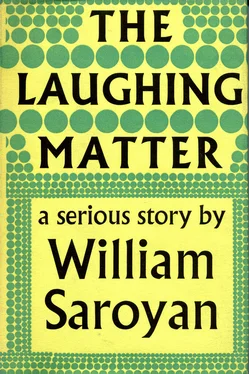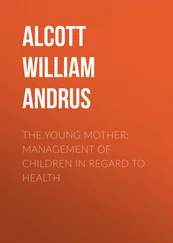“What man?”
“At the church.”
“Well,” Eva said, “he said, ‘God is love, God loves everybody, everybody must love everybody,’ and then I fell asleep. What did your man say?”
“He said God is love a couple of weeks ago,” Fanny said, “but today he said some other stuff. I didn’t listen.”
“Did you fall asleep, too?”
“No, I just got tired listening. I used to listen. I used to listen to every word. I used to believe every word, too.”
“I believe every word,” Eva said. “Don’t you?”
“I should say not!” Fanny said. “God is love!”
“He is,” Eva said. “God is the Father, and my father is the one who loves.”
“Says who?” Fanny said.
“Says who?” Eva said. “What’s that mean?”
“Who says your father is the one who loves?”
“I do,” Eva said. “Isn’t your father the one? Isn’t he the one who loves?”
“Loves who?”
“You.”
“Oh, well,” Fanny said. “I guess he does. Sure he does. So what?”
“So what?” Eva said. “Isn’t it nice?”
They heard stealthy footsteps, fell silent, and moved away from the footsteps. Fay was walking around the pile of vine stumps, but she was so slow. Fay went all the way around the pile of stumps, and then went somewhere else, thinking no one had been hiding there.
“Come on,” Fanny said. “She’ll never find us, so let’s go somewhere else and hide.”
“Let’s go in the vineyard and eat grapes,” Eva said.
“Let’s go to the watermelon patch and see if we can find one that’s ripe,” Fanny said. “They’ve been harvested, the season’s over, but maybe we can find one that’s ripe.”
“All right,” Eva said. “I love watermelons.” They walked in silence, then Eva said, “I love my mother. I love my brother, but most of all I love my father.”
“Why?” Fanny said.
“He’s the one,” Eva said. “He carries me. He talks to me. He tells me stories. He tells me things to make me laugh. He looks at me, and that’s best of all. He looks at me and I know he loves me.”
“How do you know?”
“He looks.”
They came to the watermelon patch, about a quarter of an acre beside an irrigation ditch. There were misshapen and sad-looking little melons on some of the vines.
“Is this one good?” Eva said.
“For hogs,” Fanny said. “That’s a cull.”
“Isn’t it a watermelon?”
“It’s a cull watermelon. A cull is a watermelon that’s no good from the beginning. It’s lopsided and small, and inside nothing is red or sweet. It’s pale and has no flavor at all, almost. We’ll find a good one, though. We had hundreds and hundreds of good ones when it was the season. There’s always a few late ones.”
They wandered among the vines, Fanny kicking a cull now and then, breaking it, but not laughing. Eva watched and wondered why she didn’t laugh when she did something so funny. Eva kicked one, but not the way Fanny did. It didn’t even break. She didn’t kick it again, but looked at it as if she had been rude and was sorry. Poor little cull.
“Here’s one,” Fanny said. She bent over a melon that was quite big, long and well shaped. Fanny tapped it with her knuckles, then said, “It’s ripe, too. We’ll break it open and eat the heart.” She kicked the stem of the melon free of the vine, picked it up, and walked with it to the irrigation ditch. She held it about a foot above the grass and let it fall. It cracked. Fanny put her hand in the crack, split the melon open, and there it was for Eva to see, all red with rows of fine black seeds. “This is your half,” Fanny said, “and this is mine. Let’s sit down and eat the heart.”
“All right,” Eva said, “and thank you very much, Fanny Walz.”
“Ah,” Fanny said, “you’re so polite. Just eat the watermelon. In another couple of days it would have been rotten. We got to it just in time.” She dug her fingers into the heart of the melon and brought up a handful of the stuff with not one seed in it. “That’s the way to do it,” she said. “It’s the best way to eat a watermelon. The heart’s the best part.” She gobbled up every bit she had in her hand. Eva dug in the way Fanny had and began to gobble up the heart of her half.
It was sweet and delicious, and where they were sitting was nice, the water in the ditch moving slowly, the grass growing all around, the sun gone now, but the light of it still keeping the color of the grass green, the shapes of its stalks and leaves clear.
There was so much to eat that Eva’s belly got full and tight before she was finished. Still she didn’t want to stop. When she had eaten every bit of the heart and some of the rest of the watermelon, Fanny was standing, waiting, so Eva got up, and they began to walk back to the game.
“That Fay!” Fanny said. “She just can’t play any game. We were right there behind the pile of vine stumps and just because we kept moving around it, she didn’t have sense enough to know we were there. I’ll bet she hasn’t found anybody yet. If it had been me , I would have found everybody in two seconds, and I would have beat everybody back to the olive tree, too.”
“I know,” Eva said, for she was sure Fanny would have done exactly what she had said.
It was almost dark now. They came slowly to the olive tree, then went to Mrs. Blotch.
“Where’s Fay?” Fanny said.
“Out somewhere looking for you, I guess,” Mrs. Blotch said.
“Where’s Flora?”
“Out hiding, I guess.”
“Where’s Red?” Eva said.
“Out hiding, too, I guess.”
“Fay can’t find anybody,” Fanny said. “We found a ripe watermelon and ate the heart.”
“Yes,” Eva said.
When it was dark they saw Red and Flora walking slowly to the olive tree. After a moment they saw Fay, too. When they met at the olive tree, they looked at one another and didn’t speak. This was so because the game had petered out, and it was night.
After church and Sunday dinner Warren Walz told his wife the truth about Friday night.
“I knew,” May Walz said.
“How did you know?”
“I just did.”
“When did you find out?”
“When you came to get me at Dade’s house, although I refused to believe it then.”
“I’m sorry, May, but I had to tell you.”
“I knew you would” the woman said. “I thought it might take longer.”
“You have a right to be angry.”
“Forget it,” the woman said. “Let me forget it. I wouldn’t be able to begin to forget it until you had told me, but now that you have, please never again humiliate me by being ashamed of yourself. Anything would be better than that. I will not have my daughters ashamed of their father, and they already are, especially Fanny. You’ve known that yourself or you wouldn’t have tried to stand on your head beside her last night. That was the best moment of yours I’ve ever witnessed. If having made a fool of yourself did that to you, I’m glad you made a fool of yourself.”
“Are you sure you’re all right?” the man said. “I thought my telling you would end our marriage.”
“You sound as if you’d prefer our marriage to end.”
“That’s not so,” the man said. “I think you know how much I’ve always loved you, in spite of the oppression you—or something in marriage itself—became to me. Five years ago at the Huntingtons’ when I got drunk, for instance, and made a pass at their cousin from St. Louis, it wasn’t like this . I’d been scared by you before, but what happened then really scared me. A man doesn’t like to feel that it’s compulsory to love his wife, May. It got to be awfully compulsory for me.”
Читать дальше












